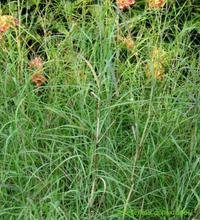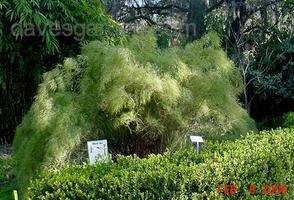





Have you been looking for something different for your garden? How about a plant that is very fine-textured and almost fernlike, and which arches gracefully from branched, upright stems? How about soft mounds of billowy foliage that wave freely with the slightest breeze? If this sounds like something you might like, then bamboo muhly (Muhlenbergia dumosa) is an ornamental grass that deserves your consideration.
With a name like bamboo muhly, one might expect the grass to have the bad manners of some of the bamboo plants. However, this slow-growing, clumping grass spreads slowly from underground stems. Although it makes a clump 4 to 6 feet tall and as wide or wider, it never becomes invasive; nor does it spread from seeds and come up in unexpected places.  The name is descriptive, for it resembles a small, very finely textured bamboo. Bamboo muhly is native to southern Arizona and northern Mexico, but it performs well in the southeastern United States, as well. It is hardy in USDA Zones 8 to 10 and is hardy to at least 10°F.
The name is descriptive, for it resembles a small, very finely textured bamboo. Bamboo muhly is native to southern Arizona and northern Mexico, but it performs well in the southeastern United States, as well. It is hardy in USDA Zones 8 to 10 and is hardy to at least 10°F.
Gardeners who plant the beautiful pink muhly (Muhlenbergia capillaris) or the more recently introduced M. capillaris ‘White Cloud', both of which have conspicuous, airy blooms in fall, might expect bamboo muhly to perform similarly. It does not, because the flowers of bamboo muhly are insignificant. You may notice masses of small flowers at the tips of the foliage when the grass is in bloom, at which time the plants take on a pinkish cast. The flowers, though, are not the main attraction. It is the soft billowy foliage that gives the landscape a totally unique look and makes gardeners want to include this grass in their gardens.
Culture
In the Garden
Use bamboo muhly as a screening plant or as a background accent. It will have a lasting presence since it is evergreen in areas within its hardiness range.  The fern-like leaves and lacy texture are a perfect complement to other broadleaf shrubs and flowering plants. Plant three to five plants for a mass of foliage in a large border, or plant one specimen if your space is smaller. Bamboo muhly performs well in large containers, and it is at home beside swimming pools and other water features. Like other grasses, it is always in motion. As an added benefit, it is deer resistant.
The fern-like leaves and lacy texture are a perfect complement to other broadleaf shrubs and flowering plants. Plant three to five plants for a mass of foliage in a large border, or plant one specimen if your space is smaller. Bamboo muhly performs well in large containers, and it is at home beside swimming pools and other water features. Like other grasses, it is always in motion. As an added benefit, it is deer resistant.
While most of us prefer traditional medicines that we purchase at the pharmacy, it should be noted that bamboo muhly has been used for chest and bowel ailments. Although we may not use it medicinally, we may choose to grow bamboo muhly for its soft green, almost chartreuse foliage that gives a soft, feathery look to the landscape. An internet search revealed many sources for this attractive grass, and it is commonly available at nurseries within its hardiness range.
At a Glance
Common name: Bamboo muhly, Faury bamboo grass
Scientific name: Muhlenbergia dumosa
Say: mew-len-BERG-gee-uh doo-MO-suh
Family: Poaceae (grass)
USDA Hardiness Zones: 8-9
Size: 4-6 ft. tall/6-8 feet wide
Origin: Southern Arizona and northern Mexico
Salt tolerance: High
Other: Deer, drought, and insect resistant
Exposure: Full sun
Thanks to Darius and Kell for images of bamboo muhly.Copyright © www.100flowers.win Botanic Garden All Rights Reserved